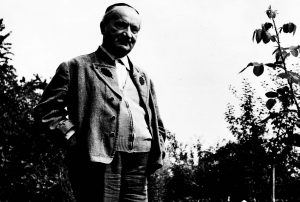Peter Salmon in New Humanist:
 On 24 July 1967, the poet Paul Celan gave a reading in Freiburg im Brisgau. At the time he was on a leave of absence from Saint-Anne psychiatric hospital, where he had been interned after suffering a nervous breakdown, in the midst of which he attempted suicide. At the reading was the philosopher Martin Heidegger. The day after the reading Celan was invited to a meeting with Heidegger at the philosopher’s hut. On arrival Celan signed the guestbook, then the two men went for a walk, which was curtailed by rain, and were driven back to the hut. After their brief meeting Celan returned to Saint-Anne’s. One week later, on 1 August, Celan wrote a poem about the encounter in the form of a single, oblique sentence named after the place where Heidegger’s hut stood, “Todtnauberg”. The title contained two words crucial to both the the poetry of Celan and the philosophy of Heidegger – berg meaning mountain, and todt, death.
On 24 July 1967, the poet Paul Celan gave a reading in Freiburg im Brisgau. At the time he was on a leave of absence from Saint-Anne psychiatric hospital, where he had been interned after suffering a nervous breakdown, in the midst of which he attempted suicide. At the reading was the philosopher Martin Heidegger. The day after the reading Celan was invited to a meeting with Heidegger at the philosopher’s hut. On arrival Celan signed the guestbook, then the two men went for a walk, which was curtailed by rain, and were driven back to the hut. After their brief meeting Celan returned to Saint-Anne’s. One week later, on 1 August, Celan wrote a poem about the encounter in the form of a single, oblique sentence named after the place where Heidegger’s hut stood, “Todtnauberg”. The title contained two words crucial to both the the poetry of Celan and the philosophy of Heidegger – berg meaning mountain, and todt, death.
What was discussed on their walk is not known – some have speculated they discussed their shared interest in botany, while other accounts suggest that Heidegger talked about his recent interview with the magazine Der Spiegel. But it is what was not discussed, between a Jewish poet who survived the Holocaust and a philosopher who was one of the highest-profile sympathisers of Nazism, that has continued to resonate for more than 50 years.
Paul Celan was born Paul Antschel (Celan is a reversal of the two syllables) in 1920, into a German-speaking Jewish family in Bukovina in Romania. His father, Leo, was a Zionist, who insisted his son learn Hebrew, while his mother, Fritzl, insisted, as a devotee of German literature, that German be the language spoken at home. After briefly studying medicine in Tours, France – a Jewish quota made it impossible for him to study in Romania – he returned to Bukovina in 1939. His journey to France had taken him through Berlin, where, from the train, he saw plumes of smoke rising the day after Kristallnacht. Under German occupation in Bukovina, Celan was interned in a ghetto, writing poetry and translating Shakespeare’s sonnets while being forced to gather and destroy Russian books. In a life shot through with historical symbolism, the significance of these simultaneous acts seems terrifyingly apt.
More here.
